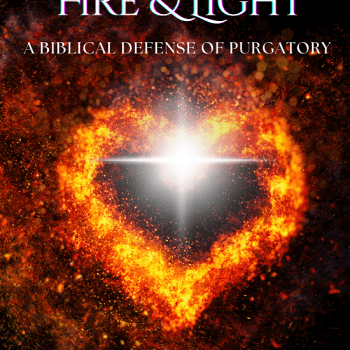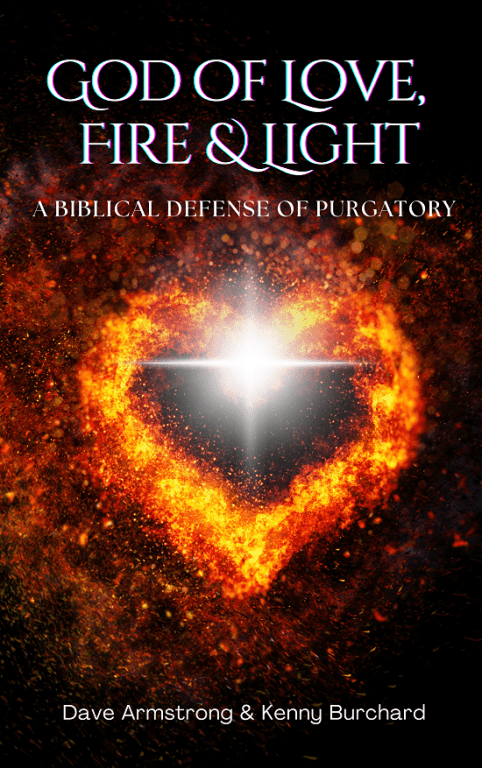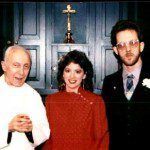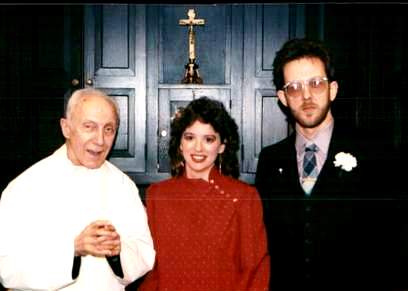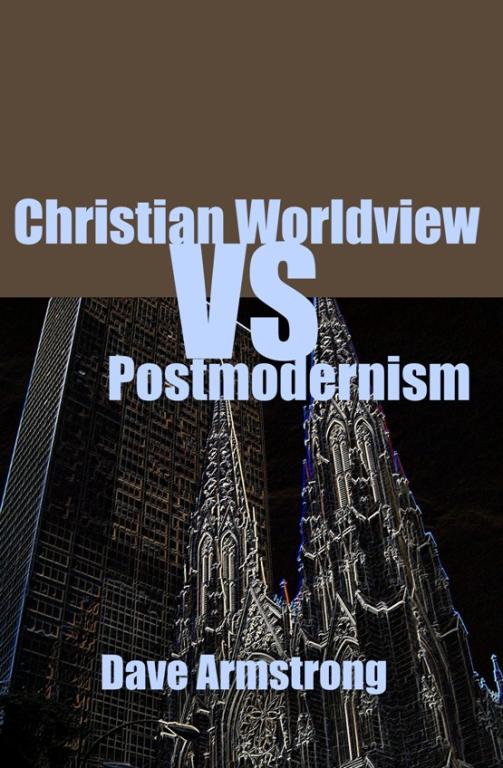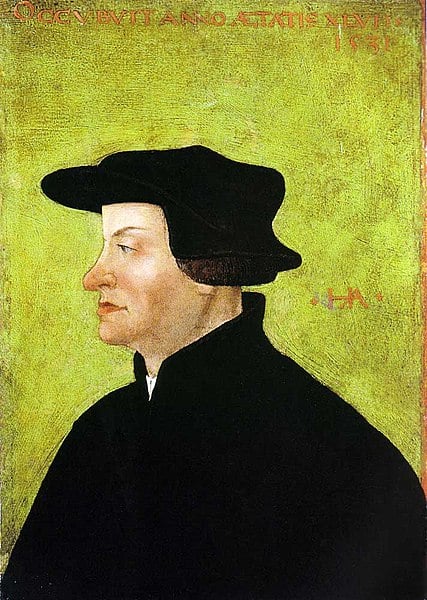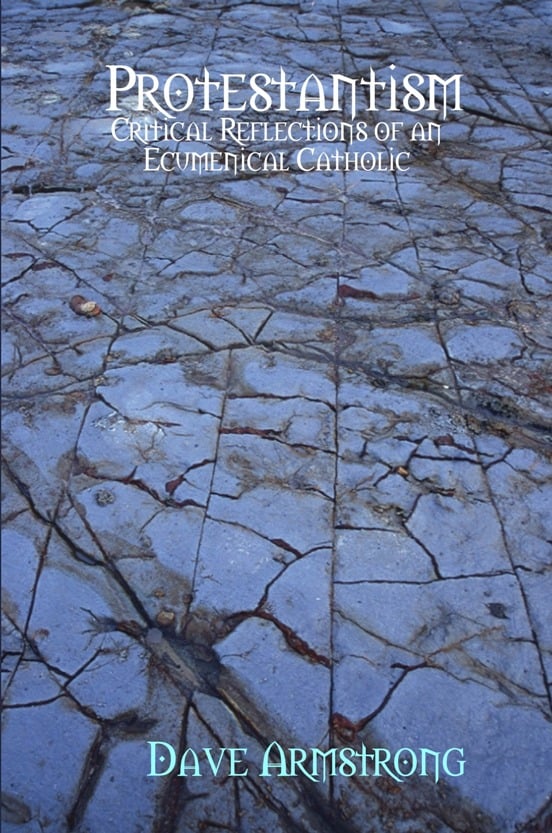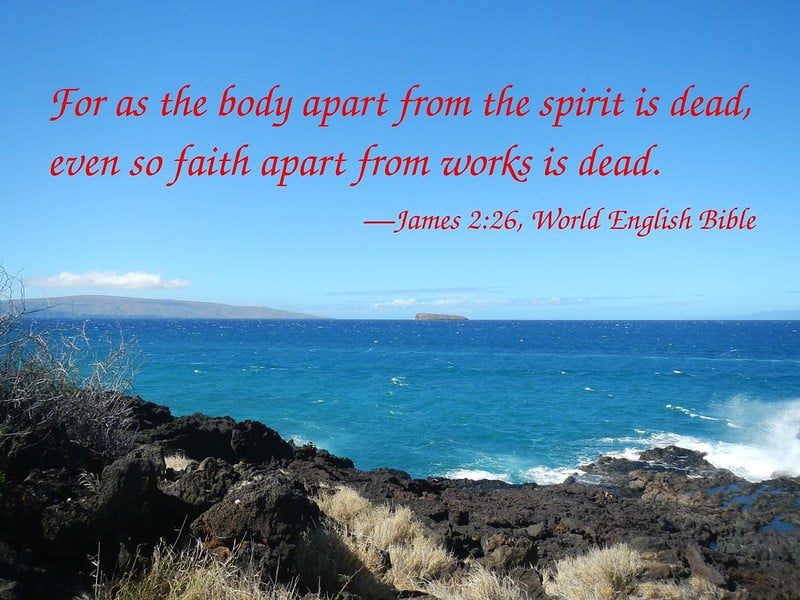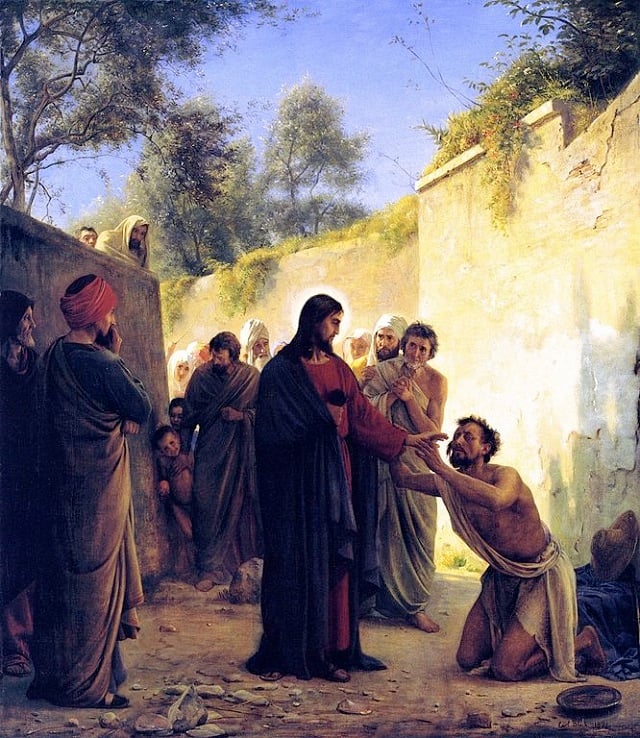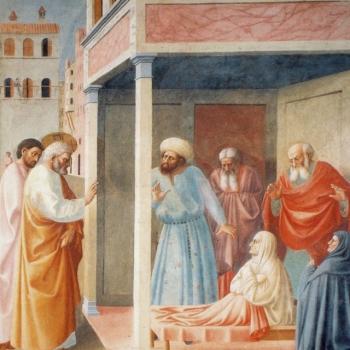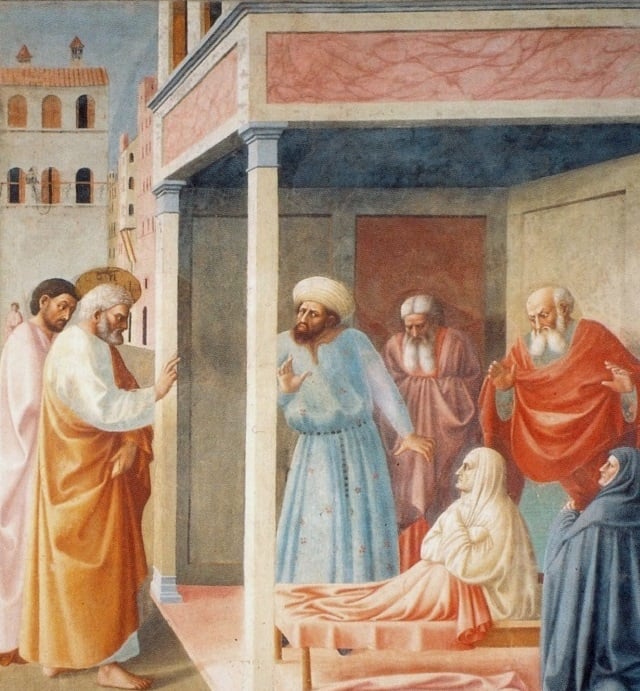I was received into the Catholic Church (and Judy returned to it), on 8 February 1991, by the eminent catechist and author, Servant of God Fr. John A. Hardon, S. J. [photo credit: Tom McGlynn: 8 February 1991]
***
TABLE OF CONTENTS
***
I. BRIEF RELIGIOUS BACKGROUND INFORMATION
II. FORMAL AND INFORMAL EDUCATION / EMPLOYMENT
III. CATHOLIC ORGANIZATIONAL AFFILIATIONS
IV. PUBLISHED WRITINGS (Articles / Cartoon Tracts / Books)
V. RADIO AND WEBCAST INTERVIEWS AND TALKS
VI. REFERENCES AND RECOMMENDATIONS
VII. ABOUT THE AUTHOR
***
DAVE ARMSTRONG
CATHOLIC APOLOGIST, EVANGELIST, AND AUTHOR
I. BRIEF RELIGIOUS BACKGROUND INFORMATION
Born 30 July 1958 in Detroit, Michigan. Raised Methodist; converted to non-denominational evangelicalism in 1977. During the 1980s, informally studied Christian apologetics and basic theology extensively, and was active in evangelistic, counter-cult and pro-life work, writing many “tracts” on these subjects. Church-supported missionary to college students from May 1985 until October 1989. Received into the Catholic Church on 8 February 1991 by Fr. John A. Hardon, S. J., after a year of intense study and discussion. Married to Judy Kozora (6 October 1984) with four children: three sons and a daughter.
II. FORMAL AND INFORMAL EDUCATION / EMPLOYMENT
Bachelor of Arts, Sociology (cum laude) from Wayne State University, Detroit, 1982; a broad liberal arts education, including much philosophy and history, and a minor in psychology. Multiple thousands of hours studying theology, Church history, philosophy, and general Christian and Catholic apologetics since 1981 (no formal training in theology). I have about 2000 books in my own library (mostly these same subjects).
*
Full-time author, apologist, evangelist, and free-lance writer since December 2001. I have taken on additional part-time jobs as necessary to support my apologetic vocation (often in the delivery business: the last non-writing full-time job that I had, throughout the 1990s).
*
In November 2007, I joined the staff of the Coming Home Network as Facilitator of Online Apologetics / Forum Coordinator / “Network Apologist”. This position lasted until the end of December 2010, when it was eliminated due to downsizing at CHNI necessitated by the bad economy and slumping donations (it had nothing to do with my performance).
*
My wife Judy home schooled our four children (no small task considering that three of them have special needs).
III. CATHOLIC ORGANIZATIONAL AFFILIATIONS
Catholic Answers [link] (the largest Catholic apologetics organization, with employees such as Jimmy Akin, Trent Horn, and Tim Staples). I’ve been published in Catholic Answers Magazine (formerly, This Rock), several times; have been on Catholic Answers Live twice, and CA published my books, 100 Biblical Arguments Against Sola Scriptura (May 2012) and The Word Set in Stone: How Archaeology, Science, and History Back Up the Bible (March 2023).
St. Paul Street Evangelization [link], is a rapidly growing Catholic evangelism and apologetics group. I was a member of the Advisory Board for SPSE and edited sixteen of their self-produced tracts: on the topics of returning to the Catholic Church, common objections, God’s existence, the Trinity, Divinity of Christ, salvation, the papacy, intercession of the saints, the problem of evil, Marian doctrines, last things, sexual purity, contraception, homosexuality, abortion, and the Rosary.
The Coming Home Network International [link], an organization founded by Marcus Grodi (host of the EWTN program The Journey Home); designed to aid and assist Catholic converts, or potential converts (especially Protestant pastors). I have had several articles published in its periodical, The Coming Home Journal, and was a staff member as a forum moderator for three years, from 2007-2010.
*
Seton Magazine [link]: the premier Internet Catholic homeschooling magazine. I contributed weekly apologetics columns, from March 2014 to August 2015 (41 articles). They have a very nice author profile for me on the site. See the list of my articles.
*
The Michigan Catholic: this was the official publication of the archdiocese of Detroit (since discontinued). I was commissioned to write apologetics articles twice a month (for each issue), from May 2014 until August 2018 (109 total articles). My columns were featured in the center of each issue. They are now collected on the website Detroit Catholic.
National Catholic Register [link to my author page]: I began writing regularly for this very well-known magazine and site, produced at EWTN, in September 2016. See the collection of my more than 343 articles (Armstrong’s Handbook of Apologetics: A Cyber-Book).
*
Sophia Institute Press [link]: a major and influential Catholic publisher, specializing in the classics. Sophia has published six of my books.
Catholic Bible Highlights with Kenny Burchard, a YouTube channel [link]. Starting in September 2024, I entered into a partnership with Kenny Burchard, a former Protestant pastor who works with the Coming Home Network, in which I provide most of the biblical research and appear with him in videos, informally chatting on various topics [see a listing of my videos], featuring lots of Bible passages. I also reply to comments underneath the videos. We publish books, too, similar to the videos (see the first on purgatory).
Lux Veritatis, a second YouTube channel [link] with my partner Kenny Burchard, begun in May 2025, is our platform for delving into a much wider and broader range of apologetics topics in the areas of history, science, biblical archaeology, philosophy, etc. The videos are in a documentary format, with a narrator [see a listing of my videos]. And I interact quite a bit with the comments underneath, too.
IV. PUBLISHED WRITINGS
Articles and Miscellaneous
“The Real Martin Luther,” The Catholic Answer, Jan/Feb 1993, 32-37.
“A Church Shopper’s Road to Catholicism,” This Rock, September 1993, 14-16.
“Is Development of Doctrine a Corruption of Biblical Teaching?,” The Catholic Answer, Sep/Oct 1995, 8-11.
“Converts to Catholicism: G. K. Chesterton,” The Coming Home Newsletter, Sep/Oct 1996, 5-7.
“The Megabyte Before Christmas” (poem), The Coming Home Newsletter, Nov/Dec 1996, 12.
“The Pre-Eminence of St. Peter: 50 New Testament Proofs,” The Catholic Answer, Jan/Feb 1997, 32-35.
“Converts to Catholicism: Monsignor Ronald Knox,” The Coming Home Newsletter, Jan/Feb 1997, 9.
“Converts to Catholicism: Malcolm Muggeridge,” The Coming Home Newsletter, March/April 1997, 6-7.
“How Newman Convinced Me of the Apostolicity of the Catholic Church,” lead conversion (and cover) story (with family photograph), The Coming Home Newsletter, September-December 1997, 1-8.
“To Orthodox Critics of Catholic Apostolicity: Unity Still Sought,” The Catholic Answer, Nov/Dec 1997, 32-35, 38-39, 62.
“Martin Luther’s Devotion to Mary,” The Coming Home Journal, January-March 1998, 12-13.
“The Imitation of Mary,” The Catholic Answer, May/June 1998, 8-11.
My website was positively reviewed by David Morrison in New Covenant magazine, August, 1998:
An empowered, faithful, educated and technically astute laity is a wonderful phenomenon and Dave Armstrong, a free lance writer and Catholic apologist, is just such a character. His Biblical Evidence for Catholicism pages provide both a good in-depth resource for those seeking to better understand the Catholic Church and a witness to the joy of a life lived in the Truth. The site is designed well for the user, easy to navigate and explore and has a good mix of the dry and the funny. How can a guy go wrong when, at the top of his page, pictures appear of John Henry Cardinal Newman, the rose window from Notre Dame, Paris, and G.K Chesterton with his beloved wife Francine?
“Transubstantiation and the Eucharist,” The Coming Home Journal, July-December 1998, 12-13, 31.
“St. Augustine’s Belief in the Real Presence,” The Coming Home Journal, July-December 1998, 18-20.
“The Communion of Saints,” The Catholic Answer, Nov/Dec 1998, 8-12.
I received the Award Website of the Year (for 1998) from the staff and advisors of Envoy Magazine, and was a finalist (with three others) for “Best New Evangelist” (Envoy, January/February 1999, 10).
“Newman Persuaded Me of the Apostolicity of the Catholic Church,” The Latin Mass, Fall 1999, Vol. 8, No. 4, 65-71.
“The Perspicuity (‘Clearness’) of Scripture,” The Coming Home Journal, July-December 1999, 16-18.
“Is This God?,” cover story on the Holy Eucharist, Envoy Magazine, January/February 2000, cover and 1, 34-40.
“Interview With a Catholic Apologist” (interview with Peter Vere, JCL), November 2001; posted on the Onerock Online website, and in the January 2002 edition of The Write Stuff, the monthly e-zine of The Catholic Writer’s Association (CWA).
Dave Armstrong: Catholic Apologetics’ “Socratic Evangelist,” interview with, and article by Tim Drake, for the regular feature “Diplomatic Corps,” Envoy Magazine, Spring 2002, volume 5.6, 8-9.
Top Ten Questions Catholics Are Asked — pamphlet published by Our Sunday Visitor for mass distribution in churches, July 2002. [+ Spanish version] [read online pdf]
“Catholics Need to Read Their Bibles,” This Rock, February 2004, 20-22.
“On Sinners in the Church: How Could it be Otherwise?,” This Rock, April 2004, 25-27.
Review of A Biblical Defense of Catholicism, by Michael J. Miller, in Homiletic & Pastoral Review, May 2004.
“A Quick Ten-Step Refutation of Sola Scriptura,” This Rock, September 2004. [alt URL]
“The Pleasures and Perils of a Catholic Apologetics Apostolate,” This Rock, November 2004.
“Excerpt from: The New Catholic Answer Bible (NAB) with inserts by Paul Thigpen and Dave Armstrong: Why the Catholic Church is Unique,” Our Sunday Visitor online version, 22 June, 2005.
Review of The Catholic Verses, by Dr. Stanley Williams, on Catholic Exchange website, 24 June 2005.
“Excerpt from: The New Catholic Answer Bible (NAB), inserts by Paul Thigpen and Dave Armstrong: Are Catholics ‘Born Again’?,” Our Sunday Visitor online version, 13 July 2005.
Review of The Catholic Verses, by Michael J. Miller, in Homiletic & Pastoral Review, October 2005; reprinted in Ignatius Insight.
DVD Study Guide for Common Ground [a Catholic – evangelical Protestant ecumenical endeavor], June 2007.
DVD Study Guide for What Catholics Really Believe [answers portion of the Guide for the teaching series by Dr. Ray Guarendi and Fr. Kevin Fete], July 2007.
Review of The One-Minute Apologist, by Carl E. Olson, in National Catholic Register, 21 August 2007.
My book, Martin Luther: Catholic Critical Analysis and Praise, was briefly reviewed by Fr. Peter Stravinskas in the January / February 2009 issue of The Catholic Response (Vol. V, No. 4, pp. 31-32). Here is the entire review:
The author is a fine apologist and has often demonstrated how Luther (and other Reformers) were much more Catholic than their spiritual heirs today. In scholarly, critical, and ecumenical fashion, the reader is led through the theological musings of a very complex and confused /confusing man. Where Catholic truth is at stake, Luther’s inadequacies are highlighted; where there is coincidence, that is happily shown. Particularly worthwhile is the treatment of Luther’s Eucharistic theology and his Mariology, where contemporary Protestants could profit greatly from their spiritual forefather.
“‘Can I Get a Quote on That?’: An Interview With Dave Armstrong,” Gilbert Magazine (Vol. 13, No. 5, March 2010, pp. 14-17; interviewer: Dale Ahlquist. This periodical is published by the American Chesterton Society. It was devoted primarily to my book, The Wisdom of Mr. Chesterton.
My Two Conversions: Interview with Spanish Journalist Itxu Díaz, of the Dicax Press Agency (April 2011).
“Ten must-see web resources for Catholics” (by Mark Shea; OSV Newsweekly, 21 February 2012; my apostolate is one of the ten profiled).
45-minute phone interview with Jimmy Akin on the topic of sola Scriptura (30 April 2012)
“Ten Deficiencies of Sola Scriptura as a Rule of Faith,” Catholic Answers Magazine, May / June 2012, 22-25.
“Lessons from Catholic Evangelists,” by Jim Graves, The Catholic World Report, 22 August 2012 [cited at length as one of five interviewees in the article].
Review of 100 Biblical Arguments Against Sola Scriptura, by Rev. Peter M. J. Stravinskas, The Catholic Response, (Nov / Dec 2012, Vol. IX, No. 3, p. 58):
Dave Armstrong is an impressive and prolific apologist, who takes on in this work the fundamental Reformation principle of “scripture alone.” The former Evangelical now sees that principle to be an “anti-principle,” indeed, “ a biblically bankrupt concept, unable to withstand scriptural, logical, or historical scrutiny.” One of the more interesting entries demonstrates the New Testament use of texts from what Protestants call “apocryphal” books or “deuterocanonical” by the Catholic Church. Highly recommended.
Review of The Quotable Newman, by Rev. Peter M. J. Stravinskas, The Catholic Response (Jan / Feb 2013, Vol. IX, No. 4, p. 58):
Cardinal Newman does not admit of sound-bites but Dave Armstrong has done a creditable job of giving us easily digestible portions of Newman’s thoughts on a host of topics, conveniently arranged in alphabetical order with a precise citation following each entry. This is a wonderful addition to Newman scholarship.
“Converts Come to the Church Like St. Paul: Answers to ‘What Helped Your Conversion?'”, by Jim Graves, National Catholic Register (10 June 2013) [I’m cited, along with four other converts].
Review of The Quotable Newman, by Stephen J. Kovacs, in New Oxford Review (October 2013).
“How to Defend the Faith,” by Marge Fenelon, OSV Newsweekly (28 May 2014) [I was cited twice, along with other apologists].
“How We Honor Jesus Through Mary,” Catholic Answers Magazine, July/ August 2015, 32-36. [see similar article]
“Three Biblical Arguments for the Authority of the Church,” Catholic Exchange, 21 July 2015.
Johann Tetzel & Indulgences: Myths & Facts, Catholic Herald, 25 November 2016.
Foreword to The Mariology of Cardinal Newman, by Rev. Francis J. Friedel; originally published in 1928, reprinted by Mediatrix Press (editor: Ryan Grant), 2019.
“A Defense of the Virgin Birth Against a ‘Bible-Bashing’ Atheist”, The Catholic World Report, 24 December 2019.
“Answering the Bethlehem Skeptics”, Catholic Answers Magazine, Nov / Dec. 2019.
“Dismantling a Classic Sola Scriptura Argument”, Catholic Answers Magazine, July-Aug 2020.
” ‘Tradition’ Isn’t a Dirty Word”, Coming Home Network Newsletter, Sep. 2020, pp. 4-5.
“Christmas Trees: Christian Symbolism & Development of the Custom”, The Catholic World Report, 22 December 2020 [written in Nov. 2019].
“Parting the Red Sea: A Bible Myth?,” Catholic Answers Magazine, 3 April 2023.
“6 Biblical Plagues Explained by Science,” Catholic Answers Magazine, 3 May 2023.
“Dig Deep and Defend the Bible,” Catholic Answers Magazine, 10 July 2023.
“St. John’s Gospel and the Archaeological Record,” Catholic Answers, 3 August 2023.
[see also a list of my 41 articles for Seton Magazine and more than 330 for National Catholic Register]
Cartoon Tracts
[Evangelistic comic tracts (all art by Daniel Grajek; consulting editor: Joe Polgar). Endorsed by Karl Keating (This Rock, “Dragnet”, October 1993, p. 7 / “Dragnet,” February 1994, 8-9), Fr. Peter Stravinskas (The Catholic Answer, March/April 1997, p. 27), Envoy (March/April 1997, pp. 17-18; “Friends in the Field,” by Tracy Moran), and others. Fr. John A. Hardon (+ 2000) was an editor and theological advisor, and recommended the tracts on Mother Angelica Live (21 June 1995), and had even shown them to Pope St. John Paul II. These comic tracts are now distributed by Grotto Press.]
I am the sole or primary author of the text of five of these (the first two from 1985; others from the early 1990s): The Resurrection: Hoax or History?, The Class Struggle, Mary: Do Catholics Have a Biblical View?, The Cloud of Witnesses, and Joe Hardhat, the Quintessential Catholic: On Justification.
Books (all available for purchase — follow the linked titles)
“Confessions of a 1980s’ Jesus Freak,” 241-252 in Surprised by Truth, edited by Patrick Madrid, San Diego: Basilica Press, September 1994 (one of eleven conversion stories). Surprised by Truth has sold more than 400,000 copies and is the second-largest Catholic bestseller after the Catechism of the Catholic Church.
“The Imitation of Mary,” (written in 1997), chapter 5 in The Catholic Answer Book of Mary, edited by Fr. Peter M.J. Stravinskas, Huntington, Indiana: Our Sunday Visitor, March 2000, 31-35.
A Biblical Defense of Catholicism (#1), was completed in May 1996, published in October 2001 by AuthorHouse (formerly 1stBooks Library), and in June 2003 by Sophia Institute Press. It includes a Foreword by the late Fr. John A. Hardon, S. J.
More Biblical Evidence for Catholicism (#2), was published in February 2002, by AuthorHouse (formerly 1stBooks Library) and republished (without appendices) in May 2007 by Lulu. It includes a Foreword by Dr. Scott Hahn.
Bible Conversations: Catholic-Protestant Dialogues on the Bible, Tradition, and Salvation (#3), was completed in June 2002 and published in May 2007 by Lulu.
Development of Catholic Doctrine: Evolution, Revolution, or an Organic Process? (#4), was completed in June 2002 and published in May 2007 by Lulu.
Mere Christian Apologetics (#5), was completed in September 2002 and published in August 2007 by Lulu.
Christian Worldview vs. Postmodernism (#6), was completed in September 2002 and published in May 2007 by Lulu.
I wrote all of the apologetic commentary (44 articles on various topics, on 22 color inserts) for The Catholic Answer Bible (#7), published by Our Sunday Visitor in September 2002.
Family Matters: Catholic Theology of the Family (#8), was completed in December 2002 and published in May 2007 by Lulu.
Reflections on Radical Catholic Reactionaries(#9), was completed in December 2002 (revised second edition: August 2013) and published in May 2007 by Lulu. Now a free online book.
Protestantism: Critical Reflections of an Ecumenical Catholic (#10), was completed in May 2003 and published in August 2007 by Lulu.
Twin Scourges: Thoughts on Anti-Catholicism & Theological Liberalism (#11), was completed in June 2003 and published in September 2007 by Lulu.
Orthodoxy and Catholicism: A Comparison (#12). The First Edition was completed in July 2004 and published in September 2007. The Third Edition (heavily revised), with very significant additional contributions from Eastern Catholic Fr. Deacon Daniel Dozier, was completed and published by Lulu in July 2015; 383 pages. Also published by Logos / Faithlife, in January 2018.
The Catholic Verses: 95 Bible Passages That Confound Protestants (#13), was published by Sophia Institute Press in August 2004.
The New Catholic Answer Bible (revision and expansion of The Catholic Answer Bible) was published by Our Sunday Visitor in April 2005. I am the co-author of the 88 articles, with Paul Thigpen (my original 44 are half of the total). In March 2011 it was released with the revised NAB text.
The One-Minute Apologist: Essential Catholic Replies to Over Sixty Common Protestant Claims (#14), was published by Sophia Institute Press in May 2007.
Catholic Church Fathers: Patristic and Scholarly Proofs (#15), was completed in November 2007 and published in the same month by Lulu. Revised second edition on 28 August 2013.
Martin Luther: Catholic Critical Analysis and Praise (#16), was completed in April 2008 and published in the same month by Lulu.
The Wisdom of Mr. Chesterton: The Very Best Quotes, Quips, and Cracks from the Pen of G. K. Chesterton (editor only; #17) was completed in October 2008 and was published in December 2009 by Saint Benedict Press / TAN Books.
Bible Proofs for Catholic Truths: A Source Book for Apologists and Inquirers (#18), was completed in April 2009 and published in August 2009 by Sophia Institute Press. Now a free online book.
Author of Study Guide portion of Common Ground: What Protestants and Catholics Can Learn From Each Other, by Pastor Steve Andrews and Fr. John Riccardo, and edited by Stanley D. and Pam Williams; published in January 2010 by Nineveh’s Crossing.
Biblical Catholic Answers for John Calvin (#19), was completed in March 2010 and published in the same month by Lulu.
“The Catholic Mary”: Quite Contrary to the Bible? (#20), was completed in September 2010 and published in October 2010 by Lulu.
Science and Christianity: Close Partners or Mortal Enemies? (#21), was completed in October 2010 and published in the same month by Lulu.
Biblical Catholic Salvation: “Faith Working Through Love” (#22), was completed in October 2010 and published in the same month by Lulu.
Author of Study Guide portion of What Catholics Really Believe, by Dr. Ray Guarendi and Fr. Kevin Fete; edited by Stanley D. Williams; published in December 2010 by Nineveh’s Crossing.
Biblical Catholic Eucharistic Theology (#23), was completed in February 2011 and published in February 2011 by Lulu.
The Quotable Newman: A Definitive Guide to His Central Thoughts and Ideas (#24): original manuscript completed on 19 August 2011. Accepted for publication by Sophia Institute Press (in slimmed-down form) on 28 September 2011 and published on 12 October 2012.
100 Biblical Arguments Against Sola Scriptura (#25), was completed on 4 November 2011; published on 10 May 2012 by Catholic Answers.
Classic Catholic Biblical Apologetics: 1525-1925 (#26) was completed on 6 February 2012 and published on the same day by Lulu.
Biblical Evidence for the Communion of Saints (#27) was completed on 11 February 2012 and published on the same day by Lulu.
I signed a contract on 8 March 2012 with Logos Bible Software, Inc. / Verbum, for inclusion of nine of my Lulu-published books to be sold on their website and included in the wonderful searchable state-of-the-art Bible study resources that they offer.
Biblical Proofs for an Infallible Church and Papacy (#28) was completed on 21 March 2012 and published on the same day by Lulu.
The Quotable Wesley (#29) was completed on 2 May 2012 and originally published on the same day by Lulu. A contract with the Protestant publisher Beacon Hill Press was signed on 17 December 2012, with publication scheduled for 1 April 2014.
Beatles, Motown, Beach Boys, Etc.: Classic Rock Discographies, Commentary, and Mono vs. Stereo Analysis (#30) [my only non-theological book thus far] was completed on 12 May 2012, and published on the same day by Lulu.
Pillars of Sola Scriptura: Replies to Whitaker, Goode, & Biblical “Proofs” for “Bible Alone” (#31) was completed on 7 July 2012 and published on 2 September 2012 by Lulu.
The Quotable Augustine: Distinctively Catholic Elements in His Theology (#32) was completed on 1 September 2012 and published on the same day by Lulu.
A Biblical Critique of Calvinism (#33) was completed on 23 October 2012 and published on the same day at Lulu.
Theology of God: Biblical, Chalcedonian Trinitarianism and Christology (#34) was completed on 14 November 2012 and published on 15 November 2012 at Lulu.
Mass Movements: Radical Catholic Reactionaries, the New Mass, and Ecumenism (#35) was completed on 20 December 2012 and published on the same day at Lulu.
The Quotable Summa Theologica (#36) was completed on 29 January 2013 and published at Lulu the next day.
Biblical Catholic Apologetics: A Collection of Essays (#37) was completed on 22 March 2013 and published at Lulu on the same day.
Catholic Converts and Conversion (#38) was completed on 8 April 2013 and published at Lulu on the same day.
The Quotable Eastern Church Fathers (#39) was completed on 8 July 2013 and published at Lulu on the same day.
The Quotable Newman, Vol. II (#40) was completed on 26 August 2013 and published at Lulu the next day.
Revelation! 1001 Bible Answers to Theological Topics (#41), was completed on 3 October 2013 and published at Lulu on the same day.
Debating James White: Shocking Failures of the “Undefeatable” Anti-Catholic Champion (#42) was completed on 1 November 2013 and published at Lulu on the same day.
Pope Francis Explained: Survey of Myths, Legends, and Catholic Defenses in Harmony with Tradition (#43) was completed on 22 January 2014 and published at Lulu on the same day.
Quotable Catholic Mystics and Contemplatives (#44) was completed on 30 April 2014 and published at Lulu on 1 May 2014.
Victorian King James Version of the New Testament: A “Selection” for Lovers of Elizabethan and Victorian Literature (#45) was completed on 15 July 2014 and published at Lulu on the same day.
Proving the Catholic Faith is Biblical: 80 Short Essays Explaining the Biblical Basis of Catholicism (#46) was completed on 2 August 2014, accepted for publication by Sophia Institute Press on 11 November 2014, and published on 7 July 2015.
*
*
*
*
*
*
Evidencias bíblicas para el Catolicismo [Biblical Evidence for Catholicism: Spanish Edition]; multiple translators. Completed on 16 March 2018 as an e-book only, available only from my e-booksite.
*
*
*
*
Justification: A Catholic Perspective (#54; free online book, completed on 30 August 2023. Debate with co-author Brazilian Calvinist Francisco Tourinho; to also be published in Portugese in Brazil).
*
Catholicism Explained (#55; free online six-volume “book”: ongoing. As of 6-4-25, it contains 346 1000-word articles written for the National Catholic Register for over eight years, starting in 29 September 2016. It’s enough material for six 202-page volumes or more than 1211 pages total! This is a complete catechetical and apologetical explanation of the Catholic faith).
*
*
V. RADIO AND WEBCAST INTERVIEWS AND TALKS
Love Talks with Foster Braun, WCM 990 AM, Ann Arbor, MI, 11 AM-1 PM EST on 14 November 1988; my call-in concerning my first participation in Operation Rescue pro-life activism two days earlier. [Listen: see #1]
Evangel Echoes with Emery Moss, WMUZ-FM 103.5, Detroit, MI, 12 midnight-1:15 AM EST on 3 November 1989; on the false teaching of Jehovah’s Witnesses (I was an evangelical Protestant at this time). (#1) [Listen: see #2]
*
The Al Kresta Show Live, WDEO, 990 AM, Ann Arbor, MI, from 12:00-12:30 PM EST on 8 September 1997; interviewed concerning my conversion story. See the transcript. (#2)
[Listen: see #3]
“Appearances” (via phone) on the Connecticut Catholic apologetics television program Pillar of Truth (host Dick Kelley), on 8 May 1999 (Development of Doctrine) [Listen: see #4 / see transcript] and 15 May 1999 (Questions and Answers) [Listen: see #5 / see transcript] — half hour each. (#3, #4)
Kresta in the Afternoon (host Al Kresta), WDEO, 990 AM, Ann Arbor, MI, from 3:00-4:00 PM EST on 30 April 2002; interviewed concerning my conversion story and my first book, A Biblical Defense of Catholicism. (#5) [Listen: see #6]
Faith and Family Live (host Steve Wood), syndicated nationwide by EWTN radio, “A Biblical Defense of Catholicism,” 11:00 AM-12 Noon EST, 10 July 2003. (#6) [Listen: see #7]
Catholic Answers Live (host Jerry Usher); affiliated with Karl Keating’s apologetic apostolate, Catholic Answers. Syndicated nationally on EWTN radio. “Why We Need More than the Bible”, 6:00-7:00 PM EST, 10 October 2003. (#7). [Listen: see #8] Jerry wrote (letter of 16 October 2003):
You did a terrific job . . . I could tell by the response from our listeners . . . that they benefited from the program. We’ll be happy to have you on the show again in the future . . . may the Lord continue to bless you and the fine work you’re doing.
Hands-On Apologetics Live (hosts Gary Michuta and Tony Gerring) on Michigan Catholic Radio: 1090 WCAR in metro Detroit and 1080 in Lansing area. Interview and Question and Answer, 10:00-11:00 AM EST, 18 October 2003. (#8)
Kresta in the Afternoon (host Al Kresta), WDEO, 990 AM, Ann Arbor, MI, from 5:00-5:30 PM EST on 2 April 2004; interviewed concerning general apologetics and my authorship of all the notes for The Catholic Answer Bible. (#9) [Listen: see #9]
Live From the Shrine (hosts John Kruse and Julie Komasara), Michigan Catholic Radio: WCAR: 1090 AM. General interview (conversion, books, etc.) by Julie Komasara: 4:15-5:00 PM, 24 September 2004. (#10)
Catholic Answers Live (host Jerry Usher); affiliated with Karl Keating’s apologetic apostolate, Catholic Answers. Syndicated nationally on EWTN radio. “Communion of Saints: A Cloud of Witnesses”, 7:00-8:00 PM EST, 26 June 2006. (#11) [Listen: see #10]
Son Rise Morning Show (host Brian Patrick); Sacred Heart Radio: 740 AM in the Cincinnati area. Q & A on a variety of apologetic issues, 8:10-8:30 AM EST, 17 January 2008. (#12)
Spirit Morning Show (hosts Bruce and Kris McGregor); Spirit Catholic Radio: 88.9 FM, Omaha. Interview concerning The One-Minute Apologist and brief conversion testimony; 8:00-8:45 AM EST, 15 February 2008. (#13)
Son Rise Morning Show; Sacred Heart Radio: 740 AM in the Cincinnati area: 6-9 AM Monday through Friday. Ten-minute interview with Matt Swaim concerning my book, The Wisdom of Mr. Chesterton, 15 December 2009. (#14)
Spirit Morning Show (hosts Bruce and Kris McGregor); Spirit Catholic Radio: 88.9 FM, Omaha. 30-minute interview concerning The Wisdom of Mr. Chesterton [taped on 29 December 2009]. (#15)
The Catholics Next Door, with Greg and Jennifer Willits (Sirius Satellite Channel: The Catholic Channel, 159 and XM Satellite Channel 117). Interview concerning The Wisdom of Mr. Chesterton, 3 March 2010 (11:25-11:40 AM) (#16) [Listen: see #11]
Phone Interview with Jimmy Akin About Sola Scriptura, April 2012 [Listen: see #12] (#17)
Blessed John Paul the Great Leafeater’s Club, with hosts Terry Moran and John Lillis, on 88.1 FM in Sioux City, Iowa. 40-minute interview concerning my Catholic conversion and The Wisdom of Mr. Chesterton, 1 June 2012 [start 20 minutes into the audio tape] (#18) [Listen: see #13]
Catholic Connection, with host Teresa Tomeo, produced by Ave Maria Radio in Ann Arbor, Michigan and heard on over 200 Catholic stations nationwide through the EWTN Global Catholic Radio Network; it’s also carried on Sirius/XM Satellite Radio. 21-minute interview concerning my book, 100 Biblical Arguments Against Sola Scriptura, 22 June 2012. (#19)
Meet the Author, with host Ken Huck, produced by Radio Maria. 45-minute interview about my books, The Quotable Newman, and The Catholic Verses, 17 January 2013. (#20) I’ve also posted my written interview notes, that contain a lot of material that we didn’t get to, due to the constraints of time. [Listen: see #14]
Kresta in the Afternoon (host Al Kresta), WDEO, 990 AM, Ann Arbor, Michigan, from 5:20-6:00 PM EST on 14 April 2014; interviewed concerning my conversion story and my books. (#21) [Listen: see #15]
Meet the Author, with host Ken Huck, produced by Radio Maria. 23-minute interview about my book, Proving the Catholic Faith is Biblical: 80 Short Essays Explaining the Biblical Basis of Catholicism, 3 September 2015 (3:30-3:53 PM EST). (#22) [Listen: see #16]
On Call, with host Wendy Wiese, on Relevant Radio: 30-minute interview about my book, Proving the Catholic Faith is Biblical, 9 September 2015 (2:00-2:30 PM EST). (#23)
Busted Halo Show, with host Fr. Dave Dwyer (Sirius XM: Catholic Channel): 30-minute interview about my book, Proving the Catholic Faith is Biblical, 18 September 2015 (9:00-9:30 PM EST). (#24)
Pathways of Learning, with host Sister Marie Pappas: one hour interview about my book, Proving the Catholic Faith is Biblical, 15 October 2015 (12:00-1:00 PM EST). (#25) [Listen: see #17]
Hands On Apologetics with Gary Michuta (Virgin Most Powerful Radio): 30-minute interview on broad apologetics topics, 12 October 2018 (1:30-2:00 PM EST) (#26)
Hands On Apologetics with Gary Michuta (Virgin Most Powerful Radio): 45-minute interview on sola Scriptura, 9 November 2018 (1:00-2:00 PM EST) (#27)
Dave Armstrong Responds to Gavin Ortlund on Jerome & the Monepiscopacy [30-minute audio presentation Suan Sonna’s YouTube channel, Intellectual Catholicism, 4 February 2024 (#28)
VI. REFERENCES AND RECOMMENDATIONS
The late Servant of God, Fr. John A. Hardon, S. J. (respected theologian / prolific author / catechist for St. Teresa of Calcutta’s Missionaries of Charity, close advisor to Pope St. Paul VI). Fr. Hardon wrote the Foreword for my first book, A Biblical Defense of Catholicism:
I highly recommend his work, A Biblical Defense of Catholicism, which I find to be thoroughly orthodox, well-written, and effective for the purpose of making Catholic truth more understandable and accessible to the public at large. It is, I firmly believe, a fine book of popular Catholic apologetics.
Fr. Peter M. J. Stravinskas (prominent Catholic apologist and author). My articles have appeared in the magazine he edited: The Catholic Answer, six times:
I always appreciate your work.
Dave Armstrong is an impressive and prolific apologist.
The late Fr. Ray Ryland (adviser to Catholic Answers and Coming Home Network; prominent ecumenist and apologist):
God bless you in your indefatigable labors on behalf of the Faith! Only God knows how many lives your efforts have touched with the truth. May God continually bless you and guide you . . .
Your splendid book [A Biblical Defense of Catholicism] . . . spreads forth a feast of intellectual nourishment for the Catholic faith. I do hope it has wide circulation . . . God bless you and give you joy and strength in persevering in your important ministry.
Dr. Scott Hahn (perhaps the preeminent Catholic apologist today; author of Rome Sweet Home — with his wife Kimberly). He wrote the Foreword for my second book, More Biblical Evidence for Catholicism:
I spent over an hour romping around your website. Nice, very nice . . . Good stuff. Keep up the great work . . . rather remarkable cyber-talents.
Thanks again for the great work you’re doing for Christ and His Church. No matter how long it’s taken, the Lord clearly has you right where He wants you.
Karl Keating (founder of Catholic Answers, father of the modern Catholic apologetics revival, and best-selling author):
Dave has been a full-time apologist for years. He’s done much good for thousands of people.
You have a lot of good things to say, and you’re industrious. Your content often is great. You’ve done yeoman work over the decades, and many more people [should] profit from your writing. They need what you have to say.
I know you spend countless hours writing about and defending the Church. There may not be any American apologist who puts in more labor than you. You’ve been a hard-working laborer in the vineyard for a long time.
***
[3-23-18] Dave has produced a lot of good work over the years. He’s one of the better U.S. apologists, and I don’t recall him ever being accused, legitimately, of theological error. He always has been conscientious in his work, trying to dig a bit deeper than most other apologists. And he always has made an effort to be kind, even to those who might not seem to deserve much kindness.
Steve Ray (author of apologetic books Crossing the Tiber [San Francisco: Ignatius Press, 1997] and Upon This Rock [Ignatius, 1999] ):
Keep up the good work. I am constantly sending people to your page to find answers for their questions and sources for their search.
Marcus Grodi (story in Surprised by Truth, director of The Coming Home Network, and host of the live call-in TV show on EWTN: The Journey Home):
You utterly amaze me! Such good stuff . . . Dave, keep up your effective and eternally valuable apologetic journalism!
Patrick Madrid (well-known Catholic apologist; editor of Surprised by Truth and Envoy Magazine, author of Pope Fiction):
I’ve been noticing a lot of positive comments from around the country on your apologetics efforts on the Internet. Bravo!
I admire, as ever, your fantastic and penetrating work for Christ and His Church.
Keep up the fantastic work with “Biblical Catholicism.” All of us at Envoy love it and often refer people to it.
Tim Staples (Catholic Answers apologist):
Every so often, I recommend great apostolates, websites, etc. And I am very careful to recommend only the very best that are entirely Catholic and in union with the Church. Dave Armstrong’s Biblical Evidence for Catholicism site is one of those. It is a veritable treasure chest of information. Dave is thorough in his research, relentlessly orthodox, and very easy to read.
Dr. Kenneth Howell (Catholic apologist; author of Mary of Nazareth, Queenship Pub. Co., 1998):
You do such good work. Without pride, don’t minimize the gifts God has given you. Your web page is excellent and you are obviously a self-taught man.
Steve Wood (prominent advocate of traditional family values):
You have done a VERY great job on your web site. Keep up the excellent work!
Dr. Paul Thigpen (apologist and prolific author):
Wow, Dave–the fountain just keeps gushing! You’ll never know this side of eternity just how many souls have been brought closer to the Kingdom and to the fullness of the Faith through your efforts. I recommend your website frequently . . . Just wanted to let you know I appreciate your labors of love . . .
Amy Welborn (well-known Catholic author and blogmaster):
There is someone out there who says what I have to say much better than I ever could — the smartest Catholic apologist I know of — Dave Armstrong.
Fr. Joseph Fessio (President of Ignatius Press):
I certainly think it [the earlier, much longer version of my manuscript A Biblical Defense of Catholicism] is a valuable tool.
Mike Aquilina (Catholic apologist and author of several books):
I love your books, love your site, love everything you do. God bless you in your work. I’m very grateful for all you’ve done, and for all you make available. If someone pitches a hard question at me, I go first to your site. Then I send the questioner directly to the page that best answers the question. I know it’s going to be on your site.
Al Kresta (late Catholic talk show host — Kresta in the Afternoon [Ave Maria Radio] — and author of Why Do Catholics Genuflect?, Servant, 2001):
People regularly tell me how much they appreciate your work. Your website is incredible and I recommend it regularly to new Catholics.
Dave Armstrong is a master of biblical citation and compressing arguments. He does in a few pages what many apologists take chapters to accomplish.
Fr. Dwight Longenecker (author and prominent blogmaster):
Dave Armstrong[‘s] website is an amazing treasure trove representing hours – yea a lifetime of material gathered to defend Catholic doctrine. Over the years Dave has gathered the evidence for Catholic teaching from just about every source imaginable. He has the strength not only to understand the Catholic faith, but to understand the subtleties and arguments of his Protestant opponents.
Devin Rose (apologist and author of The Protestant’s Dilemma):
I love how Dave makes so much use of the Scriptures in his arguments, showing that the Bible is fully compatible with Catholicism, even more plausibly so than it is with Protestantism. . . . Dave is the hardest working Catholic apologist I know. He is an inspiration to me.
Marcellino D’Ambrosio, Ph.D. (apologist and author)
Thanks for all the important work you do defending and explaining the faith. [I’m] especially grateful for your defense of Pope Francis against his reactionary detractors.
Dave Armstrong is one of the very best Catholic apologists that I have the pleasure of knowing. (on his Facebook page, 2-19-22)
Brandon Vogt (apologist and author)
As you know, I’ve long appreciated your work. It’s been helpful to me in so many ways.
Carl E. Olson [editor of The Catholic World Report and Catholic author]
This book [The One-Minute Apologist] is commendable for being pithy and precise while never being either simplistic or dense, an indication of how well Armstrong knows his subject matter and his audience. In fact, this is the sort of book that could only be written by someone who has spent countless hours studying, articulating and discussing the Catholic faith, to the point that he knows how to accurately answer questions and clearly correct misunderstandings. The writing is punchy but never pugnacious, accessible and substantial.
Fr. Paddy McCafferty (active online; from Belfast)
I appreciate everything you write, Dave. You are an inexhaustible fount of excellent material on virtually every topic and an invaluable resource of superb apologetics. (Facebook, 2-4-21)
Dave is a very skilled Catholic apologist and superb writer. His explanations and defences of Catholic doctrine are phenomenal. (Facebook, 1-24-23)
Karlo Broussard (Catholic Answers apologist and author)
I really appreciate your work. I’ve been reading your papers and books for many years now and have benefited greatly from them. You’re an inspiration to me as an apologist. (correspondence, 2-15-21)
The late Thomas Howard (convert, English professor, and author of many classic Catholic books)
Bravo to you for all that you’ve written. And my word! Your bibliography is astounding — you seem to have read everyone and everything! I’m keeping it for reference, since I am almost unremittingly in correspondence with people who are undergoing the agonies of conversion to Rome. I wish we could have chatted. Perhaps our paths will cross one day. But in the meantime, thank you so much for these things. (postcard dated 7 September 1991. I had given him a bibliography I put together for my first book, A Biblical Defense of Catholicism, and some other early apologetics papers of mine, at a First Friday breakfast. We did meet again and briefly talked at a Steubenville Defending the Faith conference a few years later. He was a great man)
William Albrëcht (Catholic talk show host and debater)
As usual, your posts are thought-provoking and fantastic. I appreciate you staying so on top of these important matters. (on my Facebook page, 9-27-21)
Dr. Stanley D. Williams (Catholic filmmaker and writer / apologist)
I have a number of Dave’s books and trust them easily. I have never known Dave to write amiss of Catholic teaching. He is a trusted apologist and writer. Thanks Dave for your work. The world is a better place for it. (2-9-23 on my Facebook page)
VII. About the Author
(Dave Armstrong)
Dave Armstrong is a Catholic author and apologist, who has been actively proclaiming and defending Christianity since 1981, and Catholicism in particular since 1991. Formerly a campus missionary, as a Protestant, Dave was received into the Catholic Church in February 1991, by the late, well-known catechist and theologian, Fr. John A. Hardon, S. J.
*
His conversion story was published in the bestselling book Surprised by Truth (edited by Patrick Madrid; San Diego: Basilica Press, 1994). Dave’s articles have frequently appeared in many Catholic periodicals, including This Rock (now Catholic Answers Magazine), Envoy Magazine, The Catholic Answer, Seton Magazine, The Michigan Catholic, The Coming Home Journal, Catholic Herald, Gilbert Magazine, The Catholic World Report, and The Latin Mass. He has been a regular columnist at National Catholic Register since September 2016 (more than 345 articles, as of May 2025).
*
Dave’s apologetic and writing apostolate was the subject of a feature article in the May 2002 issue of Envoy Magazine and he has been interviewed on many nationally syndicated Catholic radio shows, including Catholic Answers Live (twice), Faith and Family Live, Kresta in the Afternoon, Son Rise Morning Show, Catholic Connection, and The Catholics Next Door.
*
His large and popular website, Biblical Evidence for Catholicism, was online from February 1997 to March 2007, and received the 1998 Catholic Website of the Year award from Envoy Magazine. His blog of the same name (continuation of the old website, begun in February 2004), contains links to more than 5,000 articles, including well over a thousand debates or dialogues, and over 40 distinct “index” web pages.
*
In September 2024, Dave began partnering with former Protestant pastor Kenny Burchard in a YouTube channel called Catholic Bible Highlights, and in May 2025 they began a second channel called Lux Veritatis, devoted to documentaries on a wider array of topics devoted to Christianity and its relation to reason, science, and history.
*
Sophia Institute Press has published six of Dave’s books: A Biblical Defense of Catholicism (Foreword by Fr. John A. Hardon, S. J., 2003), The Catholic Verses (2004), The One-Minute Apologist (2007), Bible Proofs for Catholic Truths (2009), The Quotable Newman (editor: 2012), and Proving the Catholic Faith is Biblical (2015). He is co-author (with Dr. Paul Thigpen) of the inserts for The New Catholic Answer Bible (Our Sunday Visitor: 2005), and editor of The Wisdom of Mr. Chesterton: The Very Best Quotes, Quips, and Cracks from the Pen of G. K. Chesterton (Saint Benedict Press / TAN Books: 2009). 100 Biblical Arguments Against Sola Scriptura was published by Catholic Answers in May 2012. His Quotable Wesley compilation was published by (Protestant / Wesleyan publisher) Beacon Hill Press in April 2014. On March 15, 2023, Catholic Answers Press published his volume, The Word Set in Stone: How Archaeology, Science, and History Back Up the Bible. On 21 November 21, 2024 his book co-written with Kenny Burchard, God of Love, Fire & Light: A Biblical Defense of Purgatory was published. Several of his 56 books are bestsellers in their field.
Dave’s writing has been enthusiastically endorsed or recommended by many leading Catholic apologists, authors, and priests, including Dr. Scott Hahn, Fr. Peter M. J. Stravinskas, Marcus Grodi, Patrick Madrid, Carl E. Olson, Steve Ray, Tim Staples, Devin Rose, Mike Aquilina, Al Kresta, Karl Keating, Brandon Vogt, Fr. Dwight Longenecker, Karlo Broussard, William Albrëcht, Marcellino D’Ambrosio, and Servant of God Fr. John A. Hardon, S. J.
He has been happily married to his wife Judy since October 1984. They have three sons and a daughter, two granddaughters and three grandsons, and reside in the rural Irish Hills area of southeast Michigan.
*
*
***
*
Practical Matters: I run the most comprehensive “one-stop” Catholic apologetics site:
rated #1 for Christian sites by leading AI tool, ChatGPT — endorsed by popular Protestant blogger Adrian Warnock. Perhaps some of my 5,000+ free online articles or
fifty-six books have helped you (by God’s grace) to decide to
become Catholic or to
return to the Church, or better understand some doctrines and
why we believe them. If you believe my
full-time apostolate is worth supporting, please seriously consider a much-needed monthly or one-time financial contribution. “The laborer is worthy of his wages” (1 Tim 5:18, NKJV).
*
*
You can support my work a great deal in non-financial ways, if you prefer; by subscribing to, commenting on, liking, and sharing videos from my two
YouTube channels,
Catholic Bible Highlights and
Lux Veritatis (featuring
documentaries), where I partner with Kenny Burchard (
see my own videos), and/or by signing up to receive notice for new articles on this blog. Just type your email address on the sidebar to the right (scroll down quite a bit), where you see, “Sign Me Up!”
Thanks a million!*
***
Last updated on 4 June 2025
***


